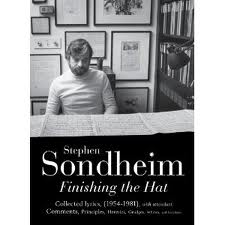| Lyrical Master Class |
Theatre Writer Book |
| Finishing the Hat- Stephen Sondheim , published by Virgin Books , December 7, 2011 |
 “Finishing the Hat” was published for Christmas 2010. Daniel Evans’ revival of “Company” in Sheffield and RWCMD’s “Merrily We Roll Along” prompts a re-reading. A second reading leaves one over-riding impression. It is the intensity of concentration, on words and the way that they work, singly, in conjunction, when applied to music. The book’s first reviewers tended to pick up on Sondheim’s critiques of his fellow lyricists. “Finishing the Hat” is part manifesto, part master class, part chronicle of an artistic education. But it is also one of the most rigorous self-critiques ever put to print.
“Finishing the Hat” was published for Christmas 2010. Daniel Evans’ revival of “Company” in Sheffield and RWCMD’s “Merrily We Roll Along” prompts a re-reading. A second reading leaves one over-riding impression. It is the intensity of concentration, on words and the way that they work, singly, in conjunction, when applied to music. The book’s first reviewers tended to pick up on Sondheim’s critiques of his fellow lyricists. “Finishing the Hat” is part manifesto, part master class, part chronicle of an artistic education. But it is also one of the most rigorous self-critiques ever put to print. An early song from “Saturday Night” (1954) spurns the word “airplane” in favour of the archaic “aeroplane.” But then it is stressed to be sung as aer-oh-plane” rather than “aer-uh-plane.” “Mix”, written for, but cut, from “West Side Story”, contains too many uses of the letters “s” and “n”. The result makes “the Jets sound more like a radiator than a gang on the warpath.” In “A Funny Thing Happened on the Way to the Forum” the writer commits “the error of bring witty instead of comic.” “America” contains some lines that are “respectably sharp and crisp but some melt in the mouth as gracelessly as peanut butter and are impossible to comprehend.” Formally, “Finishing the Hat” covers the first thirteen works, preceded by an essay that analyses poetry versus the lyric that is intended for singing. He explains exactly why great writers like Anthony Burgess, Truman Capote or Langston Hughes fall short. “Their lyrics convey the aura of a royal visit; they announce the presence of the writer.” Auden and Kallman’s words for Stravinsky’s “Rake’s Progress” may read gracefully but “sing unintelligibly.” On the other hand Oscar Hammerstein’s use of language is compared to that of Eugene O’Neill. A melody, of Jerome Kern is “symphonic in its granite-like simplicity.” A preface declares three precepts for his art. One- “Less is More”- is cited too by Edmund de Waal in his surprise best-seller “The Hare with Amber Eyes”. The wrangling with words never ends. “Finding appropriate rhymes that haven’t been used before is one of the few pleasures of lyric writing, an occupation that consists mainly of tedious list-making and frustration.” In “America” a line with the wrong consonants turn “small fee” into “smafee” when sung. Period language is difficult, particularly for one who confesses to being a “lazy reader.” Nonetheless a single phrase “Attend the tale”, from “Sweeney Todd”, is subjected to three hundred words of analysis. In the US “penchant” can be rhymed with “trenchant.” But when “A Little Night Music” moves to London the lyric needs a re-write. But then too he is able to celebrate moments of absolute rightness. A change of a single small word can intensify the emotional tone. In “Losing My Mind” “I go to sleep/To think about you”, the “to” works to hugely greater effect than “and”. The best of critical writing leaves two things in its wake. It awakens the urge to experience the work again. But, also, the senses feel sharpened, the eye and the ear seeing and hearing in a bigger way. Sondheim demonstrates how accents, dialects, a character with a cold even, allow for the changing of rhymes. Frank Loesser can rhyme “picture” with “hitcha”, for “hit you.” Lorenz Hart in the right dramatic locale can rhyme “spoil” and “goil.” A Maine location for “Carousel” allows Oscar Hammerstein to rhyme “stickler” and “pertickler”. But differences can erupt between composer and lyricist. To Leonard Bernstein, from Massachusetts, “dawn”, “lawn”, “gone” and “on” all rhyme in a manner alien to the New Yorker. “Finishing the Hat” is not a show business autobiography, but as a chronicle of the making of musicals, it does not escape some rich anecdote. An aside of Hermione Gingold in audition is unforgettable. Music that does not make it into “West Side Story” is re-used by Bernstein for his “Chichester Psalms.” A diva, unhappy with a fellow actor, ends up with “Look, you don’t react to my lines. I don’t react to yours.” A song ends with an expletive unprecedented in theatre. One argument for changing it is that the recording will not be shippable across state lines, not good for any album’s sales. “Gee Officer Krupke” is amended to the unique last line of “Krup you!” A show is failing on its try-out run and Jerome Robbins is called in. A musical needs an opener. The result “Comedy Tonight”, written over a weekend, is one of the most joyous opening numbers ever. |
Reviewed by: Adam Somerset |
This review has been read 2764 times There are 34 other reviews of productions with this title in our database:
|
